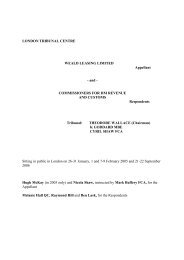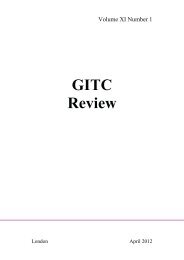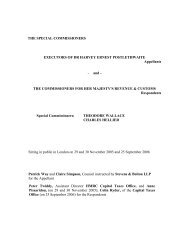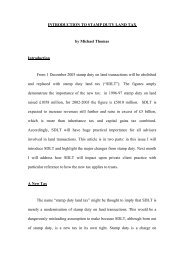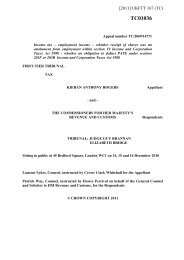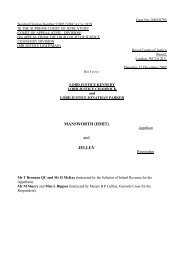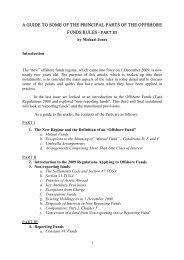A Guide to Some of the Principal Parts of the Offshore Funds Rules
A Guide to Some of the Principal Parts of the Offshore Funds Rules
A Guide to Some of the Principal Parts of the Offshore Funds Rules
Create successful ePaper yourself
Turn your PDF publications into a flip-book with our unique Google optimized e-Paper software.
A GUIDE TO SOME OF THE PRINCIPAL PARTS OF THE OFFSHORE FUNDSRULES - PART IIIntroductionMichael JonesThe “new” <strong>of</strong>fshore funds regime, which came in<strong>to</strong> force on 1 December 2009, isnow nearly a year old. The purpose <strong>of</strong> this article, which is broken up in<strong>to</strong> threeinstalments, is <strong>to</strong> consider <strong>the</strong> main aspects <strong>of</strong> <strong>the</strong> rules in some detail and <strong>to</strong> discusssome <strong>of</strong> <strong>the</strong> points and quirks that have arisen when <strong>the</strong>y have been applied in practice.In <strong>the</strong> last issue we looked at <strong>the</strong> definition <strong>of</strong> “<strong>of</strong>fshore fund”. This secondinstalment will introduce <strong>the</strong> <strong>Offshore</strong> <strong>Funds</strong> (Tax) Regulations 2009 and will explore“non-reporting funds”. The final Part, which will appear in <strong>the</strong> next issue <strong>of</strong> <strong>the</strong> GITCReview, will look at “reporting funds” and <strong>the</strong> transitional provisions.PART IAs a guide <strong>to</strong> <strong>the</strong> reader, <strong>the</strong> contents <strong>of</strong> <strong>the</strong> <strong>Parts</strong> are as follows:1. The New Regime and <strong>the</strong> Definition <strong>of</strong> an “<strong>Offshore</strong> Fund”a. Mutual <strong>Funds</strong>b. Exceptions <strong>to</strong> <strong>the</strong> Meaning <strong>of</strong> “Mutual Fund” - Conditions D, E and Fc. Umbrella Arrangementsd. Arrangements Comprising More Than One Class <strong>of</strong> InterestPART II2. Introduction <strong>to</strong> <strong>the</strong> 2009 Regulations Applying <strong>to</strong> <strong>Offshore</strong> <strong>Funds</strong>3. Non-reporting fundsa. The Settlements Code and Section 87 TCGAb. Section 13 TCGAc. Transfer <strong>of</strong> Assets Abroadd. Key Ancillary Provisionse. Exceptions from Chargef. Transparent <strong>Funds</strong>1
g. Existing Holdings as at 1 December 2009h. Disposals <strong>of</strong> Interests in Non-Reporting <strong>Funds</strong>i. Computation: Part 2, Chapter 5j. Conversion <strong>of</strong> a fund from Non-reporting in<strong>to</strong> a Reporting FundPART III4. Reporting <strong>Funds</strong>a. Constant NV <strong>Funds</strong>b. Applications for Reporting Statusc. Duties <strong>of</strong> Reporting <strong>Funds</strong>d. Computation <strong>of</strong> Reportable Income <strong>of</strong> a Reporting Funde. <strong>Funds</strong> <strong>of</strong> <strong>Funds</strong>f. What must be Reported - Transactions Treated as Non-Tradingg. Reporting <strong>to</strong> Participantsh. Tax Treatment <strong>of</strong> Participants - Treatment During <strong>the</strong> Life <strong>of</strong> <strong>the</strong> Fundi. Tax Treatment <strong>of</strong> Participants - Treatment Upon Disposal <strong>of</strong> <strong>the</strong> Interestj. Fur<strong>the</strong>r Information <strong>to</strong> be Provided <strong>to</strong> HMRCk. Breaches <strong>of</strong> <strong>the</strong> Reporting Fund Requirementsi. Discrepancies between Reported and Reportable Incomeii.iii.iv.Incorrect/Incomplete ReportsFailure <strong>to</strong> Provide InformationPrescribed Serious Breachesl. What Happens if a Fund Commits a Serious Breach?m. Voluntarily Leaving <strong>the</strong> Regime5. Transitional Provisions6. Conclusions2
2. Introduction <strong>to</strong> <strong>the</strong> New Regulations Applying <strong>to</strong> <strong>Offshore</strong> <strong>Funds</strong>In 2009 a new set <strong>of</strong> rules governing <strong>the</strong> taxation <strong>of</strong> <strong>Offshore</strong> <strong>Funds</strong> wasintroduced: <strong>the</strong> <strong>Offshore</strong> <strong>Funds</strong> (Tax) Regulations 2009, which apply from 1 December2009.The main difference between <strong>the</strong> new rules and <strong>the</strong> old ICTA rules is that <strong>the</strong>re isno longer a requirement for an <strong>of</strong>fshore fund <strong>to</strong> distribute its income in order for itsparticipants <strong>to</strong> obtain chargeable gains treatment upon a disposal. Instead <strong>the</strong> participantswill receive that treatment if <strong>the</strong> <strong>of</strong>fshore fund reports its income <strong>to</strong> its participants (with<strong>the</strong> consequence that <strong>the</strong> participa<strong>to</strong>rs will be taxed on that reported income). In effect,<strong>the</strong> new regime means that <strong>the</strong> participa<strong>to</strong>rs are taxed on amounts that <strong>the</strong>y might not yethave received.The rules make a distinction between two types <strong>of</strong> <strong>of</strong>fshore fund (reg.4):(a)(b)non-reporting funds andreporting funds.The default rule is that an <strong>of</strong>fshore fund is a non-reporting fund unless it is a fund <strong>to</strong>which Part 3 <strong>of</strong> <strong>the</strong> Regulations applies.3. Non-reporting <strong>Funds</strong>Part 2 <strong>of</strong> <strong>the</strong> Regulations concerns <strong>the</strong> treatment <strong>of</strong> Participants in Non-reporting<strong>Funds</strong>. The key operative provision is regulation 17, which creates <strong>the</strong> charge <strong>to</strong> tax. Itprovides that <strong>the</strong>re is a charge <strong>to</strong> tax if (i) a person disposes <strong>of</strong> an asset, (ii) <strong>the</strong> asset is <strong>of</strong>a relevant type, and (iii) as a result <strong>of</strong> <strong>the</strong> disposal an <strong>of</strong>fshore income gain arises <strong>to</strong> <strong>the</strong>person making <strong>the</strong> disposal.Broadly speaking, <strong>the</strong> “assets” in question are:(i)(ii)an interest in an <strong>of</strong>fshore fund which is a non-reporting fund at <strong>the</strong> time <strong>of</strong><strong>the</strong> disposal.an interest in an <strong>of</strong>fshore fund which, at <strong>the</strong> time <strong>of</strong> <strong>the</strong> disposal, is areporting fund but which was previously a non-reporting fund. N.B.however, that if a regulation 48 (“clean slate”) election has been made on<strong>the</strong> conversion <strong>of</strong> a non-reporting fund <strong>to</strong> a reporting fund (see below) orsuch an election could have been made but <strong>the</strong> interest was not standing at again, <strong>the</strong>n regulation 17 will not apply.Under regulation 18 <strong>the</strong> “<strong>of</strong>fshore income gain” arising from <strong>the</strong> disposal <strong>of</strong> <strong>the</strong> asset inquestion is treated for all <strong>the</strong> purposes <strong>of</strong> <strong>the</strong> Tax Acts as income which arises at <strong>the</strong>time <strong>of</strong> <strong>the</strong> disposal. The deemed income is treated as arising <strong>to</strong> <strong>the</strong> person making <strong>the</strong>disposal.3
Where <strong>the</strong> person in question is within <strong>the</strong> charge <strong>to</strong> income tax <strong>the</strong> tax is chargedunder Chapter 8 <strong>of</strong> Part 5 <strong>of</strong> ITTOIA 2005 (miscellaneous income) for <strong>the</strong> year <strong>of</strong>assessment in which <strong>the</strong> disposal is made. Where <strong>the</strong> person is within <strong>the</strong> scope <strong>of</strong>corporation tax <strong>the</strong> charge is under Chapter 8 <strong>of</strong> Part 10 <strong>of</strong> CTA 2009 (miscellaneousincome) for <strong>the</strong> accounting period in which <strong>the</strong> disposal is made.Regulation 19 applies where <strong>the</strong> person concerned is a remittance basis user and itseffect is <strong>to</strong> treat <strong>the</strong> deemed income as “relevant foreign income”. However, <strong>the</strong>se rulesdo not apply where <strong>the</strong> participant is a beneficiary <strong>of</strong> a non-resident settlement, <strong>to</strong> whichregulation 20 applies.a. The Settlements Code and Section 87 TCGAThe first thing that regulation 20 does is <strong>to</strong> preclude a charge <strong>to</strong> tax under <strong>the</strong>settlements code (Chapter 5 <strong>of</strong> Part 5 <strong>of</strong> ITTOIA 2005) on an <strong>of</strong>fshore income gain thatarises <strong>to</strong> a settlement <strong>the</strong> trustees <strong>of</strong> which are nei<strong>the</strong>r resident in <strong>the</strong> UK nor ordinarilyresident <strong>the</strong>re. In o<strong>the</strong>r words, settlors <strong>of</strong> non-UK resident settlements do not have<strong>of</strong>fshore income gains deemed <strong>to</strong> be <strong>the</strong>irs.The next thing that regulation 20 does is <strong>to</strong> provide that <strong>the</strong> <strong>of</strong>fshore income gainsthat arise <strong>to</strong> <strong>the</strong> trustees <strong>of</strong> a section 87 TCGA 1992 settlement are designated <strong>the</strong> “OIGamount” (reg.20(2)). The relevant provisions in <strong>the</strong> TCGA are <strong>the</strong>n adjusted so that <strong>the</strong>OIG amounts can be attributed beneficiaries <strong>of</strong> <strong>the</strong> settlements in <strong>the</strong> same way as if <strong>the</strong>ywere capital gains.It should be noted that <strong>the</strong> effect <strong>of</strong> regulation 20(4) is <strong>to</strong> ensure that <strong>of</strong>fshoreincome gains are matched <strong>to</strong> capital payments out <strong>of</strong> a section 87 TCGA settlementbefore capital gains are matched. It should also be noted that <strong>the</strong> person <strong>to</strong> whom <strong>the</strong><strong>of</strong>fshore income gain arises is treated as <strong>the</strong> person making <strong>the</strong> disposal <strong>of</strong> <strong>the</strong> interest in<strong>the</strong> fund (reg.20(5)).b. Section 13 TCGALinked <strong>to</strong> regulation 20 is regulation 24, which has <strong>the</strong> effect <strong>of</strong> applying Part 2 <strong>of</strong><strong>the</strong> Regulations <strong>to</strong> section 13 TCGA 1992 so that <strong>of</strong>fshore income gains arising <strong>to</strong> a nonresident,but o<strong>the</strong>rwise close, company are apportioned <strong>to</strong> its UK resident participa<strong>to</strong>rs. In<strong>the</strong> usual way, if an <strong>of</strong>fshore income gain arises <strong>to</strong> a non-UK resident company which isheld by non-UK resident trustees <strong>the</strong> <strong>of</strong>fshore income gain is treated as arising in <strong>the</strong>settlement so that it can be apportioned <strong>to</strong> relevant beneficiaries under section 87 TCGA(as modified, see above).c. Transfers <strong>of</strong> Assets AbroadRegulation 21 is concerned with <strong>the</strong> interaction <strong>of</strong> <strong>the</strong> <strong>of</strong>fshore funds rules and <strong>the</strong>transfer <strong>of</strong> assets abroad provisions (ss.720, 731 ITA 2007). It provides that sections 720and 731 apply as if <strong>the</strong> <strong>of</strong>fshore income gain arising <strong>to</strong> <strong>the</strong> non-UK resident were income.This treatment is disapplied in relation <strong>to</strong> an <strong>of</strong>fshore income gain if it is apportionedunder section 13 TCGA (as modified) (reg.21(3))). This treatment is also disapplied in4
elation <strong>to</strong> all or part <strong>of</strong> an <strong>of</strong>fshore income gain that has been treated under regulation 20(Application <strong>to</strong> gains <strong>of</strong> non-resident settlements) as arising in a tax year <strong>to</strong> a person(reg.21(5)). Moreover, if an <strong>of</strong>fshore income gain is treated as arising under ss.720 or 731ITA 2007 in a tax year <strong>the</strong>n <strong>the</strong> “OIG amount” for section 87 TCGA purposes is reducedaccordingly (reg.21(6)).d. Key Ancillary ProvisionsFur<strong>the</strong>r key provisions are <strong>to</strong> be found in regulations 22 and 23. Those regulationsprovide that:• (By modification <strong>of</strong> s.2(1) TCGA) a person is chargeable <strong>to</strong> tax on <strong>of</strong>fshoreincome gains arising during a year <strong>of</strong> assessment for any part <strong>of</strong> which <strong>the</strong>y areUK resident or ordinarily UK resident (Reg.22(1)(a)).• (By modification <strong>of</strong> ss.10 and 10B TCGA) a person carrying on a business in <strong>the</strong>UK through a branch or agency or a UK permanent establishment is chargeable <strong>to</strong>tax on <strong>of</strong>fshore income gains arising on <strong>the</strong> disposal <strong>of</strong> a holding in an <strong>of</strong>fshorefund if <strong>the</strong> holding was held for <strong>the</strong> purposes <strong>of</strong> <strong>the</strong> UK branch, agency orpermanent establishment (reg.22(1)(b)(c)).• (By modification <strong>of</strong> s.10A TCGA) an individual who is “temporarily nonresident”(as defined in s.10A TCGA) is chargeable <strong>to</strong> income tax on <strong>of</strong>fshoregains arising during <strong>the</strong> period <strong>of</strong> temporary non-residence in <strong>the</strong> year <strong>of</strong> return <strong>to</strong><strong>the</strong> UK (reg.23).e. Exceptions from ChargeUnder regulation 25 <strong>the</strong>re is no liability <strong>to</strong> tax under regulation 17 if one <strong>of</strong> <strong>the</strong>following situations applies:1. Where <strong>the</strong> participant must treat <strong>the</strong> interest in <strong>the</strong> fund as a deemed loanrelationship (under Chapter 3 <strong>of</strong> Part 6 <strong>of</strong> CTA 2009 (OEICs, unit trusts and<strong>of</strong>fshore funds)). In this scenario income derived from <strong>the</strong> holding <strong>of</strong> <strong>the</strong> interestand any increase in <strong>the</strong> fair value <strong>of</strong> <strong>the</strong> interest will be taxed as a credit under <strong>the</strong>loan relationship rules. In such a case <strong>the</strong>re is no need for <strong>the</strong> <strong>of</strong>fshore funds rules<strong>to</strong> apply since <strong>the</strong>re will be no income roll-up.2. Where <strong>the</strong> participant must treat <strong>the</strong> interest as a derivative contract (under Part 7CTA 2009). Again, <strong>the</strong> participant will be taxed on credits arising from increasesin <strong>the</strong> fair value <strong>of</strong> its interest for as long as it is held and so <strong>the</strong>re is no role for<strong>the</strong> <strong>of</strong>fshore fund rules.3. For <strong>the</strong> same reasons, where <strong>the</strong> interest is an intangible fixed asset (under Part 8CTA 2009).4. Where <strong>the</strong> interest consists <strong>of</strong> excluded indexed securities (as defined in s.433ITTOIA 2005).5
5. Where <strong>the</strong> interest is a right arising under a policy <strong>of</strong> insurance.Regulation 26 provides that <strong>the</strong>re is no liability <strong>to</strong> tax under regulation 17 where <strong>the</strong>interest in <strong>the</strong> fund is trading s<strong>to</strong>ck or is o<strong>the</strong>rwise taken in<strong>to</strong> account in computing <strong>the</strong>pr<strong>of</strong>its <strong>of</strong> a trade (i.e. so that <strong>the</strong> disposal <strong>of</strong> <strong>the</strong> interest will give rise <strong>to</strong> an income (ra<strong>the</strong>rthan capital) pr<strong>of</strong>it (or loss)).Where <strong>the</strong> interest in <strong>the</strong> fund is a non-participating loan <strong>the</strong>re is no liability underregulation 17 (reg.29).On 28 February 2011 HMRC published a full draft <strong>of</strong> <strong>the</strong>ir proposed amendments<strong>to</strong> <strong>the</strong> <strong>Offshore</strong> <strong>Funds</strong> (Tax) Regulations 2009. One <strong>of</strong> <strong>the</strong>se proposed amendments(reg.31A) involves a fur<strong>the</strong>r exception <strong>to</strong> <strong>the</strong> charge under regulation 17 <strong>to</strong> be known as<strong>the</strong> “unlisted trading company exception”. This is <strong>to</strong> apply where <strong>the</strong> disposal is <strong>of</strong> aninterest in an <strong>of</strong>fshore fund, and where throughout <strong>the</strong> period during which <strong>the</strong> interestwas held and at <strong>the</strong> time <strong>of</strong> disposal at least 90% <strong>of</strong> <strong>the</strong> value <strong>of</strong> <strong>the</strong> assets <strong>of</strong> <strong>the</strong> fundconsisted <strong>of</strong> holdings in “qualifying companies”.For <strong>the</strong>se purposes a “qualifying company” means a “trading company” or <strong>the</strong>holding company <strong>of</strong> a “trading group” or a “trading subgroup” (all as defined), <strong>the</strong> shares<strong>of</strong> which are not listed on a recognised s<strong>to</strong>ck exchange or admitted <strong>to</strong> trading on aregulated market. It is unders<strong>to</strong>od that this exception is intended <strong>to</strong> tackle <strong>the</strong> concerns <strong>of</strong><strong>the</strong> private equity industry that many companies held by private equity funds might fallwithin <strong>the</strong> <strong>of</strong>fshore funds regime.f. Transparent <strong>Funds</strong>Subject <strong>to</strong> two exceptions, under regulation 29 no liability <strong>to</strong> tax arises if <strong>the</strong>disposal in question is <strong>of</strong> an interest in an <strong>of</strong>fshore fund (constituted o<strong>the</strong>rwise than as abody corporate) and <strong>the</strong> fund is a “transparent fund” (defined in regulation 11 as a fundwhose participants, if <strong>the</strong>y were UK resident individuals, would be chargeable <strong>to</strong> incometax as “relevant foreign income” on all sums referable <strong>to</strong> <strong>the</strong>ir interests).The first departure from <strong>the</strong> exception applies where <strong>the</strong> transparent <strong>of</strong>fshore fundhas at any time held interests in o<strong>the</strong>r non-reporting funds and those interests amounted <strong>to</strong>more than 5% by value <strong>of</strong> <strong>the</strong> transparent fund’s assets. The reasoning behind thisexception is that, without it, it would be possible <strong>to</strong> roll-up income in <strong>the</strong> underlying nonreportingfund.The second departure from <strong>the</strong> exception applies where <strong>the</strong>re is a disposal <strong>of</strong> aninterest in a transparent fund, <strong>the</strong> fund is a non-reporting fund and <strong>the</strong> fund does notprovide its inves<strong>to</strong>rs with enough information <strong>to</strong> enable <strong>the</strong>m <strong>to</strong> meet <strong>the</strong>ir UK taxobligations.It is also worth noting regulation 16, which applies where a non-reportingtransparent fund holds an interest in a reporting fund. The excess <strong>of</strong> reported income overincome actually arising <strong>to</strong> <strong>the</strong> participa<strong>to</strong>rs (see reg.94(2)) is treated as additional income<strong>of</strong> <strong>the</strong> participants in <strong>the</strong> transparent fund in proportion <strong>to</strong> <strong>the</strong>ir rights and is charged <strong>to</strong>6
tax as “relevant foreign income” (s.830 ITTOIA 2005) in <strong>the</strong> case <strong>of</strong> a person chargeable<strong>to</strong> income tax and as “miscellaneous income” (Chapter 8 <strong>of</strong> Part 10 <strong>of</strong> CTA 2009) in <strong>the</strong>case <strong>of</strong> a company within <strong>the</strong> charge <strong>to</strong> corporation tax.g. Existing Holdings as at 1 December 2009<strong>Some</strong> participa<strong>to</strong>rs will have acquired <strong>the</strong>ir interest in <strong>the</strong> fund before <strong>the</strong> new rules<strong>to</strong>ok effect, when <strong>the</strong> definition <strong>of</strong> “<strong>of</strong>fshore fund” was narrower. Regulation 30,<strong>the</strong>refore, provides an exception <strong>to</strong> tax in circumstances where <strong>the</strong> participa<strong>to</strong>r acquired<strong>the</strong>ir interest before 1 December 2009 or pursuant <strong>to</strong> rights acquired by an agreemententered in<strong>to</strong> before 30 April 2009 and that interest was not a “material interest in an<strong>of</strong>fshore fund” (as defined in s.759 ICTA).h. Disposals <strong>of</strong> Interests in Non-Reporting <strong>Funds</strong>Chapter 4 <strong>of</strong> Part 2 is where <strong>the</strong> provisions concerned with <strong>the</strong> mechanics <strong>of</strong> <strong>the</strong>disposal <strong>of</strong> interests in non-reporting funds are found. At <strong>the</strong>ir heart is <strong>the</strong> basic rule as <strong>to</strong><strong>the</strong> meaning <strong>of</strong> “disposal”, which is that used for capital gains tax purposes. Regulation33 states that:“(1) There is a disposal <strong>of</strong> an asset for <strong>the</strong> purposes <strong>of</strong> <strong>the</strong>se Regulations if <strong>the</strong>re wouldbe a disposal <strong>of</strong> an asset for <strong>the</strong> purposes <strong>of</strong> TCGA 1992(2) Paragraph (1) is subject <strong>to</strong> <strong>the</strong> following provisions <strong>of</strong> this Chapter.”The upshot <strong>of</strong> regulation 33 is that, subject <strong>to</strong> <strong>the</strong> provisions mentioned below, all <strong>of</strong> <strong>the</strong>learning on <strong>the</strong> meaning <strong>of</strong> <strong>the</strong> term “disposal”, which is not itself defined in <strong>the</strong> TCGA,is incorporated in<strong>to</strong> <strong>the</strong> <strong>of</strong>fshore funds rules, as are all <strong>of</strong> <strong>the</strong> legislative rules on deemeddisposals and part disposals. This means that when considering whe<strong>the</strong>r <strong>the</strong>re is a charge<strong>to</strong> tax under <strong>the</strong> new <strong>of</strong>fshore fund provisions one must approach <strong>the</strong> analysis as if onewere applying <strong>the</strong> CGT rules (as modified).The standard CGT position is modified by <strong>the</strong> “Fur<strong>the</strong>r Provisions” in Chapter 4 <strong>of</strong>Part 2. Those provisions concern death, corporate reconstructions and corporatereorganisations. Looking at <strong>the</strong>m in turn:Death (reg.34) – contrary <strong>to</strong> <strong>the</strong> usual CGT death rule (i.e. <strong>the</strong> “free” base cost uplift),where a person dies and <strong>the</strong> assets <strong>of</strong> which he was “competent <strong>to</strong> dispose” (see s.62(10)TCGA) at <strong>the</strong> time <strong>of</strong> his death include an interest in a non-reporting fund <strong>the</strong>n he isdeemed <strong>to</strong> have disposed <strong>of</strong> any such interest <strong>to</strong> his personal representatives for aconsideration equal <strong>to</strong> <strong>the</strong> market value <strong>of</strong> <strong>the</strong> interest at that time.Corporate Reconstructions (regs 35 and 36) – in order <strong>to</strong> prevent <strong>the</strong> sheltering <strong>of</strong><strong>of</strong>fshore income gains, sections 135 and 136 TCGA are disapplied where <strong>the</strong>reconstruction involves an exchange <strong>of</strong> an interest in a non-reporting fund for an interestin a reporting fund. In such a case <strong>the</strong> exchange is treated as a market value disposal <strong>of</strong><strong>the</strong> interest in <strong>the</strong> non-reporting fund.7
Corporate Reorganisations (reg.37) – section 127 TCGA (equation <strong>of</strong> holdings in areorganisation) is disapplied (and so an exchange will amount <strong>to</strong> a disposal <strong>of</strong> <strong>the</strong> oldholding at market value) if four conditions are met. Broadly speaking, <strong>the</strong> conditionsapply <strong>to</strong> exchanges <strong>of</strong> different classes <strong>of</strong> interest (which, under reg.6 are treated asdiscrete funds) within <strong>the</strong> same fund where <strong>the</strong> exchange is <strong>of</strong> an interest in a nonreportingfund for one in a reporting fund.i. Computation: Part 2, Chapter 5The computation <strong>of</strong> <strong>the</strong> “<strong>of</strong>fshore income gain” that will be charged <strong>to</strong> tax isexpressed <strong>to</strong> be equal <strong>to</strong> <strong>the</strong> “basic gain” (reg.38), which is essentially <strong>the</strong> gain that wouldarise under <strong>the</strong> TGCA (regs 39(1) and (2)). Again, this imports all <strong>of</strong> <strong>the</strong> existing learningon computation <strong>of</strong> gains for capital gains tax purposes. Any indexation allowance is nottaken in<strong>to</strong> account (reg.39(2)(b)).The charge on <strong>the</strong> <strong>of</strong>fshore income gain is in most cases, <strong>the</strong>refore, going <strong>to</strong> be <strong>the</strong>difference between <strong>the</strong> base cost <strong>of</strong> <strong>the</strong> interest and <strong>the</strong> consideration for <strong>the</strong> disposal.Ra<strong>the</strong>r unsportingly, according <strong>to</strong> regulation 42(1), if <strong>the</strong> effect <strong>of</strong> <strong>the</strong> computationis <strong>to</strong> produce a loss <strong>the</strong>n <strong>the</strong> “basic gain” is nil. As if <strong>to</strong> rub it in, regulation 42(3)provides that “accordingly, for <strong>the</strong> purposes <strong>of</strong> <strong>the</strong>se Regulations, no loss is <strong>to</strong> be treatedas arising on <strong>the</strong> disposal”. This means that whilst any gains can be charged as income,any losses can only be relieved as capital: if inves<strong>to</strong>rs think that that mismatch is unfair<strong>the</strong>n <strong>the</strong>y are right.There is a special rule in place (reg.43) <strong>to</strong> deal with <strong>the</strong> position where aparticipa<strong>to</strong>r holds an interest in a fund that did not constitute a “material interest” in an<strong>of</strong>fshore fund under section 759 ICTA but <strong>the</strong>n acquires fur<strong>the</strong>r rights in <strong>the</strong> fund after 1December 2009. When this happens <strong>the</strong> two different holdings are treated as being <strong>of</strong>different classes so that section 104 TCGA (share pooling) will not apply. In addition, <strong>the</strong>pre-1 December 2009 interests are treated as being disposed <strong>of</strong> before <strong>the</strong> post-1December 2009.Fur<strong>the</strong>r computational provisions are <strong>to</strong> be found in Chapter 6 <strong>of</strong> Part 2. Theirpurpose is <strong>to</strong> prevent double taxation on <strong>the</strong> occasion <strong>of</strong> a disposal that gives rise <strong>to</strong> bothan <strong>of</strong>fshore income gain and a chargeable gain. This is achieved by deducting <strong>the</strong> amoun<strong>to</strong>f <strong>the</strong> <strong>of</strong>fshore income gain from <strong>the</strong> amount received for <strong>the</strong> CGT disposal. There areo<strong>the</strong>r specific rules dealing with adjustments <strong>to</strong> section 162 TCGA (roll-over relief for<strong>the</strong> transfer <strong>of</strong> a business in consideration <strong>of</strong> shares) and section 128 TCGA(consideration given or received for new holding on a reorganisation).j. Conversion <strong>of</strong> a fund from Non-reporting in<strong>to</strong> a Reporting Fund – <strong>the</strong> “Clean Slate”ElectionAn <strong>of</strong>fshore fund that is non-reporting may wish <strong>to</strong> switch <strong>to</strong> reporting status inorder that its participants can enjoy <strong>the</strong> benefits that such status brings (see reg.52). Whenthis occurs a participant is presented with an opportunity, under regulation 48, <strong>to</strong> elect <strong>to</strong>be treated as having disposed <strong>of</strong> his interest in <strong>the</strong> non-reporting fund at market value on8
<strong>the</strong> “disposal date” (as defined) and as having acquired his interest in <strong>the</strong> reporting fundat <strong>the</strong> beginning <strong>of</strong> <strong>the</strong> reporting fund’s first period <strong>of</strong> account. Put ano<strong>the</strong>r way, <strong>the</strong>participa<strong>to</strong>r can start with a “clean slate” after <strong>the</strong> fund has attained reporting status. It isimportant <strong>to</strong> note, however, that no election can be made unless <strong>the</strong> <strong>of</strong>fshore income gainarising on <strong>the</strong> deemed disposal is greater than zero.Conclusion <strong>to</strong> Part IIAs with <strong>the</strong> old “non-distributing” funds regime, <strong>the</strong> essential aim <strong>of</strong> <strong>the</strong> non-reportingfund rules is <strong>to</strong> prevent a taxpayer from gaining a tax advantage by rolling up income inan <strong>of</strong>fshore fund and <strong>the</strong>n disposing <strong>of</strong> his interest in <strong>the</strong> fund as capital. That being <strong>the</strong>case <strong>the</strong>n, unless <strong>the</strong> interest in <strong>the</strong> fund can be structured so as <strong>to</strong> fall outside <strong>the</strong>definition <strong>of</strong> “<strong>of</strong>fshore fund”, <strong>the</strong> significant difference between <strong>the</strong> income tax“additional rate” <strong>of</strong> 50% and <strong>the</strong> <strong>to</strong>p rate <strong>of</strong> CGT (at 28%) means that holding an interestin a reporting fund can be a more attractive prospect for <strong>the</strong> inves<strong>to</strong>r, all o<strong>the</strong>r thingsbeing equal. However, being in <strong>the</strong> reporting fund regime has pros and cons for both <strong>the</strong>fund and its inves<strong>to</strong>rs, as we will see in <strong>the</strong> final part.9


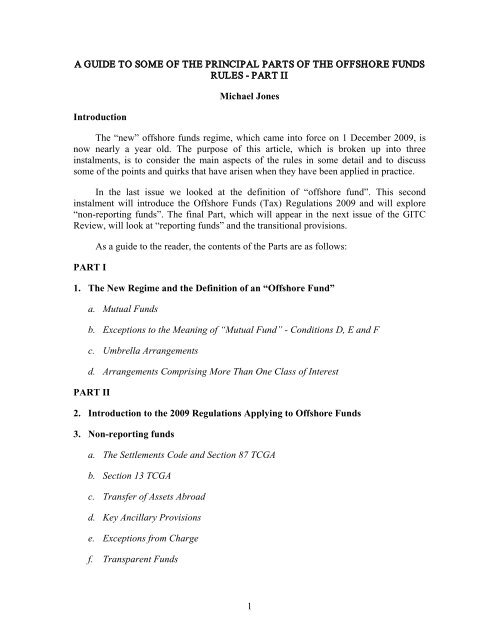
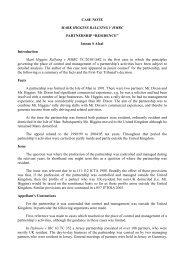
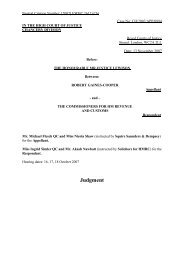
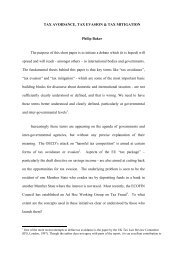
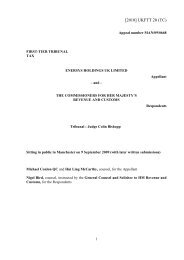
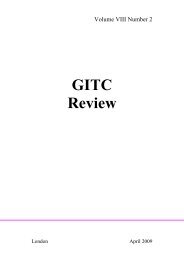
![Mohammed Siddiq Khan v. HMRC [2006] EWCA Civ 89](https://img.yumpu.com/45700564/1/184x260/mohammed-siddiq-khan-v-hmrc-2006-ewca-civ-89.jpg?quality=85)
